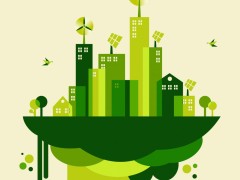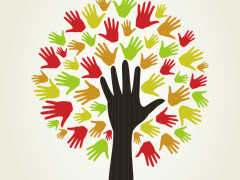I have to confess I am torn. I’m torn by my feelings of not doing enough and a frustration that my efforts are a complete waste of time. Both may be true. Here’s why.
On the one side, I have been taking steps personally to make my contribution to environmental change and carbon reduction. This past year, for example, I have been giving donations to Arbor Day Foundation for the planting of trees and Earth Justice, World Wildlife Fund, Sierra Club, among a number of other organizations.
When I fly for business I take advantage of a program on United’s website that allows me to offset the carbon of my flights. When I am on the road, I take my own soap and shampoo so I don’t have to use the ones in the hotels and waste them with a single day of use. When given the option at the hotel, I hang up my towel and don’t ask for clean ones after only one use.
At home, we’ve switched our house over completely to electricity generated by natural sources (wind and solar) even though it costs us more, an option provided in our local community. We’ve also significantly reduced the amount of beef that we eat, for both health and environmental reasons. And I have drastically reduced the amount of plastic and paper that I utilize when traveling. I carry a coffee stirrer and cloth napkin, for example, in my backpack so I don’t have to use plastic or wood ones in the coffee shops. I try to remember to bring a coffee mug with me on the road as well. And we always use cloth grocery bags when we shop and bring along the net bags for vegetables, to avoid using the plastic. We of course recycle at home and compost as well. And just recently I purchased a hybrid car. I also have reduced the speed at which I buy new electronic devices.
When I list out how I have changed my behavior, I feel good. I have taken steps to change my consumption patterns and make an individual impact, though I always feel I am not doing enough. I am trying to align my behavior with my values. There are many people do who do much more than we do. If we all get together and make changes, we can make much larger changes and move faster.
On the other side, I also sometimes feel serious despair and anger. I feel despair for two reasons. First, because I see so many people who are not taking steps at all to change their behavior. I watch the number of people who still use plastic bags in the grocery stores and the amount of paper cups and plastic lids thrown away in each and every Starbucks every day. I see the number of cars on the road and number of business travelers. At these times, I feel that I am moving around in a horror movie with thousands of people around me who are zombies, blissfully going about their rote actions as if the edge of the cliff is not in front of them.
That is when I feel the second level of despair: when we can’t seem to mobilize legislative change. Forty five years ago this week (On July 20th, 1969), we landed a human being on the moon. That was a collective endeavor that mobilized us to act together. But for something even more important, that will affect not only our own lives but the lives of our children and grandchildren, we can’t seem to mobilize ourselves.
Today, we are so divided as a nation that we can’t come together to even tackle an issue as profound and serious as human produced climate change. The right, as we all know, has argued that the explanation of human induced change was just another left-wing hoax to justify the expansion of government. The denial of the problem’s human origin, of course, has been one of if not the primary significant obstacle for achieving legislation as a means to move us faster in the direction of reducing our carbon footprint. And of course that obstinacy is part of what the right hopes to achieve. They don’t want governmental solutions to anything. They believe and want the free market to solve any issues we have, since they believe it solves problems better than any governmental intervention.
If left completely alone, of course, the market will eventually take cognizance of the problem. Clean water and air will become more expensive. Fresh fish will be more rare and farm raised. Some communities will be destroyed by rising ocean waters. Heat will get excessive in many communities. Storms will continue to destroy communities and drought will affect others. But by the time the market fully responds on its own, it will either be too late to avoid serious devastation or there will be a vast amount of unequal suffering, based on wealth.
Even under the best possible scenario, with the market responding on its own to changing costs and situations brought on by climate change, the impact will fall unequally on those with less wealth. Those with more wealth will have more opportunity to protect themselves from change by moving, with better insurance, with second homes, with more money to spend to get water and fish. The heavier burden of the impact will of course fall on those with fewer resources to remake their lives. The only consolation I feel about any of this is that some of the impact will be inescapable even for the wealthy and for those who fought against recognizing climate change. Even wealth can’t always protect someone from a flood, tornado, or drought.
Of course, there is a middle way between, on the one hand, letting the market address the problem all by itself, and on the other hand, relying on individuals alone to make changes. Neither of these approaches are satisfactory. But we can find a compromise in the middle. Cap and Trade is a market based solution that requires legislation but leverages market mechanisms to achieve its goal. Cap and Trade puts a mandatory cap on emissions while providing flexibility in how companies comply. Cap and Trade has been shown to work already in other programs, for example, in reducing Acid Rain. SO2 emissions from Acid Rain Program sources have fallen from 17.3 million tons in 1980 to about 7.6 million tons in 2008, a decrease in emissions of 56 percent.
Why we can’t get behind a Cap and Trade approach to climate change is exasperating and a symptom, in my mind, of our moral decay as a country. Cap and Trade would seem to be a way that the right and left could get together on a compromise, since Cap and Trade is the best of both worlds. It leverages the power of the market to drive change but it accelerates the market’s response through implementation of a government regulation: a cap on emissions. Those businesses that do better than the cap can trade their success for dollars to those companies that do worse than the cap. The carrot and stick moves everyone in the right direction.
The political right used to find Cap and Trade to be acceptable as a “market based” solution but has since then taken a position against the implementation of Cap and Trade. As far as I can see, this is our only hope to make real substantive change that goes beyond the haphazard efforts of the individual, which are uneven and do not bring change fast enough.
The social enterprise is the only other model that can help, by developing businesses with a social and environmental focus. Consumers can vote with their dollars by buying from companies that are protecting and restoring the environment. And while I have great optimism about the impact community, I for one would prefer to see us take all three approaches: individual change, Cap and Trade, and social enterprise.




